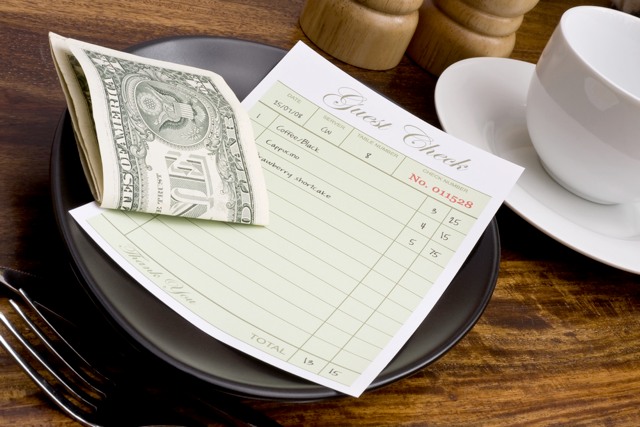It is an issue which draws differing opinions– tipping. How mandatory should tips be? Should you always tip? How much is the right amount to tip?
Here are two perspectives.
(1) Tipping 20 Percent Should Be Standard
By Christina Giannopoulos
As someone who has worked in the restaurant industry as a waitress and bartender for the last six years, I believe that tipping 20 percent should be standard. Many of you may not realize that minimum wage for a server in Massachusetts is a mere $2.63 an hour. We work for tips and this hourly wage is something most of us barely see because it mostly goes to taxes.
Serving is a tough job. Not only is it mentally exhausting, it’s also physically exhausting. It’s hard work multitasking and keeping track of every need for every table in your section and the amount of physical activity that goes into serving is well beyond what most people understand. We are constantly moving, carrying heavy trays of drinks, balancing weighty plates and running back and forth from table to table. When I get a tip that does not reflect the hard work I have put into making a customer’s dining experience an enjoyable one, it is disheartening, to say the least.
Of course I understand that if service is well below your expectations then maybe you shouldn’t have to tip 20 percent. But if everything went smoothly and your time at the restaurant was pleasant, then there is no excuse for not tipping―at the least―18 percent. If you can’t afford the tip then don’t go out to dinner and especially don’t skimp just because you don’t feel like tipping.
The tip that you leave for your server goes along with sitting down at a table in a restaurant and having someone serve you meals and drinks. Why would any one think that we are working this job just for $2.63 an hour?
Serving is a beyond demanding job and we deal with a lot of people that are rude, disrespectful and all around mean. It’s long hours and it’s hard work so if you choose to go out and dine in a restaurant that offers table service, then you must tip. If you don’t want to tip, get some take out.
(2) Tipping Should Be Discretionary
By Osahh Aim
I know what it’s like to serve and subsequently be rewarded with a tip that isn’t commensurate to the quality of service provided. I also know what it’s like to be the victim of horrible, discourteous service and still feel obligated to tip. Having been on both ends of the spectrum, I think that high percentage tips should be encouraged, but not be mandatory.
Serving is just like any other job; the pay you receive is proportional to your level of skill and how efficiently you perform your duties. The exception here is that most of a server’s income is from tips.
That being said, if a certain percentage of tipping was made mandatory, then all servers at a particular restaurant would earn the exact same amount of money (if they work similar hours), regardless of how well they might have done their job. But this could be exploited: servers who are not team players could take advantage and use this as an opportunity to slack in their service, which would be unfair to the other servers. Why should you, an efficient hardworking employee, be rewarded the same as a discourteous worker?
From a consumer’s perspective, everyone hopes to get bang for their buck. No one is willing to pay a certain amount for something they feel isn’t worth the price. I think this rule should also apply to restaurants, specifically tipping. The service of waiters is a good; therefore, the market sorts itself out and automatically chances upon a perfect price. The restaurant industry, by setting a sort of mandated percentage to be tipped, is screwing up this mechanism.
Undoubtedly, the waiting business is a tough one. The wages that servers receive are sometimes as low as two dollars an hour. This system of minimal payment was probably put in place to act as an incentive to make waiters do their jobs properly.
Consequently, paying large tips regardless of the level of service received actually hurts the food industry because it could lead to complacency amongst the workers. Complacency could lead to bad service; bad service will lead to a loss of customers and reduced revenue.
Finally, why should I have to tip a waiter if I feel like the service I received was awful? That’s like going to a hospital and paying a doctor for staring at you for a few hours.





















































